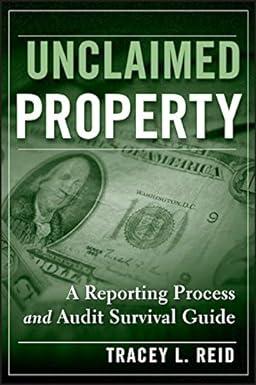Question
Bailey Corp. just completed the most profitable year in its 25-year history. Reported earnings of $1,020,000 on sales of $8,000,000 resulted in a very healthy
Bailey Corp. just completed the most profitable year in its 25-year history. Reported earnings of $1,020,000 on sales of $8,000,000 resulted in a very healthy profit margin of 12.75%. Each year before releasing the financial statements, the board of directors meets to decide on the amount of dividends to declare for the year. For each of the past nine years, the company has declared a dividend of $1 per share of common stock, which has been paid on January 15 of the following year.
Presented here is the income statement for the year and the comparative balance sheets as of the end of the last two years.
For the Year Ended
____________________________________December 31, 2011
Sales revenue $8,000,000
Cost of goods sold 4,500,000
Gross profit $3,500,000
Operating expenses 1,450,000
Income before interest and taxes $2,050,000
Interest expense 350,000
Income before taxes $1,700,000
Income tax expense (40%) 680,000
Net income $1,020,000
_____December 31____
______________________________________2011_________2010___
Cash $480,000 $450,000
Accounts Receivable 250,000 200,000
Inventory 750,000 600,000
Prepaid Expenses 60,000 75,000
Total Current Assets $1,540,000 $1,325,000
Land $3,255,000 $2,200,000
Plant and Equipment 4,200,000 2,500,000
Accumulated Depreciation (1,250,000) (1,000,000)
Long Term Investments 500,000 900,000
Patents 650,000 750,000
Total Long-Term Assets $7,355,000 $5,350,000
Total Assets $8,895,000 $6,675,000
Accounts Payable $ 350,000 $ 280,000
Other Accrued Liabilities 285,000 225,000
Income Taxes Payable 170,000 100,000
Dividends Payable 0 200,000
Notes Payable Due Within Next Year 200,000 0
Total Current Liabilities $1,005,000 $ 805,000
Long Term Notes Payable $ 300,000 $ 500,000
Bonds Payable 2,200,000 1,500,000
Total Long-Term Liabilities $2,500,000 $2,000,000
Common Stock, $10 par $2,500,000 $2,000,000
Retained Earnings 2,890,000 1,870,000
Total Stockholders Equity $5,390,000 $3,870,000
Total Liabilities & Stock Equity $8,895.000 $6,675,000
Additional information follows:
All sales are on account, as are all purchases.
Land was purchased through the issuance of bonds. Additional land (beyond the amount purchased through the issuance of bonds) was purchased for cash.
New plant and equipment were acquired during the year for cash. No plant assets were retired during the year. Depreciation expense is included in operating expenses.
Long-term investments were sold for cash during the year.
No new patents were acquired, and none were disposed of during the year. Amortization expense is included in operating expenses. Patents were credited to reflect the amortization charge.
Notes payable due within the next year represents the amount reclassified from long-term to short-term.
Fifty thousand shares of common stock were issued during the year at par value.
As Baileys controller, you have been asked to recommend to the board whether to declare a dividend this year and, if so, whether the precedent of paying a $1 per share dividend can be maintained. The president is eager to keep the dividend at $1 in view of the successful year jut completed. He is also concerned, however, about the effect of a dividend on the companys cash position. He is particularly concerned about the large amount of notes payable that comes due next year. He further notes the aggressive growth pattern in recent years, as evidenced this year by large increases in land and plant and equipment.
Required:
Prepare in good form a Statement of Cash Flows using both the direct and indirect methods.
What do you recommend to the board of directors concerning the declaration of a cash dividend? Should the $1 per share dividend be declared? Should a smaller amount be declared? Should no dividend be declared? Support your answer with necessary computations. From a cash flow perspective, include in your response your concerns about the following year. Be sure to use proper grammar and punctuation.
Step by Step Solution
There are 3 Steps involved in it
Step: 1

Get Instant Access to Expert-Tailored Solutions
See step-by-step solutions with expert insights and AI powered tools for academic success
Step: 2

Step: 3

Ace Your Homework with AI
Get the answers you need in no time with our AI-driven, step-by-step assistance
Get Started


